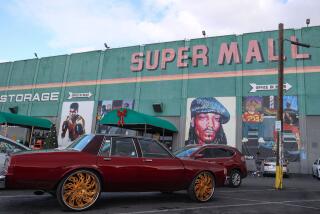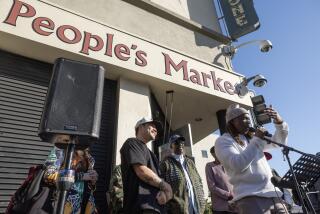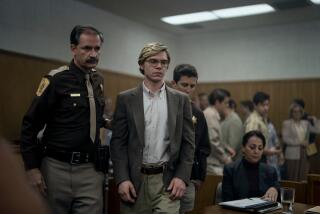‘Equal Justice’ Targets Black-Korean Strife : Television: Producer Thomas Carter, himself black, says next week’s episode is intended to stimulate dialogue about an ongoing problem.
- Share via
Just weeks after a black teen-ager was shot and killed by a Korean grocer in Los Angeles, a black teen-ager will be shot and killed by a Korean grocer on Wednesday’s episode of “Equal Justice.”
While the circumstances of the real-life tragedy and the TV depiction of racial strife differ widely, the executive producer of the ABC series said that the episode is intended as a tool to stimulate conversation about an ongoing problem that has resulted in increasing misunderstanding, racism and death in the poorer areas of many big cities.
“Both sides tend to overreact,” said Thomas Carter, executive producer of “Equal Justice” and one of the few African Americans overseeing a TV series today. “And we wanted to take a look at that. There is a level of mistrust and disrespect on both sides that breeds the kind of thing that happened here in Los Angeles.
“While we’re not here to defend the behavior of any one side, we do hope to show that African Americans don’t have a monolithic point of view on this. That both sides need to engage in some self-examination, to look at the problem rationally and have the courage to stand up for the truth so that the tense atmosphere that has led to these tragedies is defused.”
The “Equal Justice” episode, inspired by several incidents of hostilities between African Americans and Korean Americans in New York, was completed a couple of months before the March 16 shooting in South Los Angeles and depicts a situation that appears to be far less clear-cut.
In Los Angeles, a 15-year-old black girl was shot and killed following an argument with a store owner from Korea who apparently accused the girl of shoplifting. Police have said that a security camera videotape showed that the girl was not shoplifting and that she was walking away from the woman when she was shot.
In “Equal Justice,” which is set in an unnamed eastern city, the circumstances surrounding the fictionalized incident are far muddier, leaving open the possibility that the clerk fired in self-defense when the black man became aggressive following the accusation that he too was shoplifting.
In both the fictional and actual incidents, black demonstrators converged on the store, angrily accusing Koreans of showing disrespect for their black customers, some even demanding that the store be torched.
Carter said that he decided against filming a story that presented an obvious injustice and legitimized the after-the-fact outrage. Instead, he wanted to explore some of the roots of the problem and attempt to show that African Americans and the Korean community have something to learn from the other, that while blame for any one incident can obviously fall either way, both sides are responsible for the continually explosive situation.
“What we do is point up the broiling tension and deep-seated resentment that underlies any of these incidents,” said Joe Morton, who plays the show’s chief prosecutor, Mike James. “Part of this is that when immigrants come into our country, they have a lot of preconceived notions of who and what black people are from movies and from all the horrible stuff they read in newspapers. They come into the black neighborhoods with all this trepidation and that kind of suspicion and aggression is easily set off.”
But as he investigates this homicide, Morton’s character, a black man himself, points out that African Americans can learn from the Koreans’ intense sense of family and community loyalty that induces them to pool their resources and fund new businesses for other Koreans. African Americans, many of whom are struggling in broken homes, have failed to set up that kind of support system and thus don’t build businesses of their own, he says.
Carter also suggested that much of the problem stems from cultural misunderstandings. He said that Koreans maintain a serious attitude about business that can sometimes be read as rude; they don’t like to have eye contact with strangers, and they usually place a customer’s change on the counter rather than in the customer’s hand. Many blacks, Carter said, view this as racist, when in fact it is not anything personal.
“Obviously, we can’t do everything in just one episode, and I would like to make other shows on this issue that go inside both communities and get at the heart of the racism,” Carter said. “Equal Justice” has completed production for this season and is awaiting word on renewal for next year. “But what is obvious and what Mike James says is that no one is willing to look at the problem for what it is. Everyone is only seeing it through their own level of racism.
“And that is really disturbing to me to see minority groups fighting among themselves when neither of these groups have any real economic or political power. It’s a real tragedy to me because this is really a matter of the ‘have nots’ simply trying to survive amid the economic conditions of this country, and it gets diverted into racism. These people really should not be fighting each other, but fighting other battles against the things that have created this kind of economic impoverishment.”
More to Read
The complete guide to home viewing
Get Screen Gab for everything about the TV shows and streaming movies everyone’s talking about.
You may occasionally receive promotional content from the Los Angeles Times.






